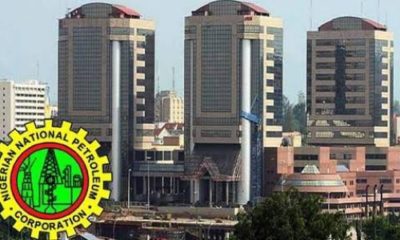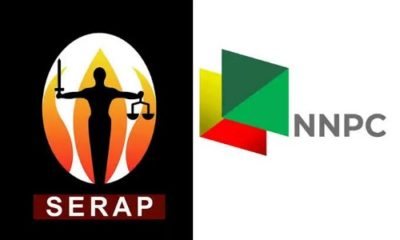Oil
NUPENG, PENGASSAN threaten showdown over planned sack of NNPC staff, PIB

LAGOS-THE Nigeria Union of Petroleum and Natural Gas Workers, NUPENG, and the Petroleum and Natural Gas Senior Staff Association of Nigeria PENGASSAN, have rejected planned sack of no fewer than 1100 workers of the Nigerian National Petroleum Corporation, NNPC, and threatened to shut down the nation’s petroleum sector should the management go ahead with the sack.
Similarly, organised labour condemned the proposed Petroleum Industry Bill, PIB, describing it as anti-labour.
Labour expressed surprise and embarrassment that the Minister of state, Petroleum Dr. Ibe Kachikwu, could make such a statement on retrenchment of workers in the NNPC without consultation or recourse to the two Unions in the oil and gas sector; NUPENG and PENGASSAN.
NUPENG in a statement by its President, Igwe Achese, vowed that organised labour in the petroleum sector would resist such a move, as the cardinal policy of President Buhari Government was job creation and not job losses.
According to NUPENG, “we cannot watch and see our members who have served for years to be thrown into the unemployment market because of inconsistent policies of the government. NNPC workers are the best because they have continued to keep the oil and gas sector moving even when they have to work with obsolete equipment and indecent work environment. The workforce should not be used as guinea pigs but commended. The unbundling of the firm into four companies and intended restructuring should not have anything to do with sack of 1,100 workers which is one sack, too many.
“We advice the Federal Government to convene a major stakeholders’ meeting to x-ray the challenges facing the sector and proffer solutions, rather than chasing shadows. Towards this, it should ensure that the stakeholders’ meeting look at the Petroleum Industry Bill together before it is represented. The current policy of the NNPC to engage casual workers is against the extant labour laws of the country and should be condemned and a stop put to it. We believe that the impending retrenchment will be counter – productive and should not be allowed as we will resist it and call out our members to protest the action if the two oil unions in the sector are not consulted.”
On its part, PENGASSAN, while condemning the proposed PIB and describing it as anti-labour, vowed to resist the plan by the Federal Government to retrench workers, especially employees of NNPC as a result of the restructuring in the proposed PIB.
The association argued that the planned sack was not in tandem with the “change” that the government promised Nigerians, especially in the area of job creation.
Reacting to the official release of the proposed draft institutional and legal frameworks for reforms in the oil and gas industry by the Minister of State for Petroleum Resources, who is also Group Managing Director, GMD, of the NNPC, PENGASSAN Acting General Secretary, Lumumba Okugbawa, said that the provisions in the proposed PIB were not only anti-labour but also not in the national interest.
The PENGASSAN scribe, who commended the renewed effort by the Minister to rejuvenate the reforms after several failed attempts in the past, noted that PENGASSAN had always been in support of the reforms in the oil and gas industry but with a caveat that it must be transparently done to make sure that stakeholders in the oil and gas industry were carried along.
He, however, contended that PENGASSAN would not support any reforms that jeopardized the welfare of its members, noting that the restructuring would be resisted if it negatively affected the Association’ members.
On the plan to sack half of the current NNPC’s employees, Okugbawa said that the plan if carried out would further compound the unemployment situation in the country, arguing that there was nothing wrong with the unbundling of the NNPC to bring about greater efficiency and effectiveness.
He insisted however, that the unbundling and repositioning of the corporation should be done with human face, saying “ we have said on many occasions that the problem of the NNPC is not the workers but the high level of political interference in the corporation and we are satisfied that the current government has promised to give the Corporation free hand to operate for better service delivery to the Nigerian nation. Some of the inconsistencies noted by PENGASSAN in the draft bill include : a subtle ploy in Section 87 (Transfer of Staff) to retrench or drop some of the work force transiting to the new Nigeria Petroleum Regulatory Commission (NPRC) with the contentious clause ‘’transfer of certain employees”
Oil
NNPC Discovers Over 4,800 Illegal Pipeline Connections

The Nigerian National Petroleum Company (NNPC) Limited has revealed the detection of more than 4,800 unauthorized connections on oil pipelines within the country, painting a troubling image of the nation’s primary source of revenue.
Mele Kyari, the Group Chief Executive Officer of NNPC Ltd, communicated this information to the Senate Committee on Appropriations last Friday.
He said, “We have over 4,800 illegal connections on our pipelines. That means in some lines, within 100 kilometres of pipelines, you have as much as 300 insertions.
“Therefore, even when you produce the oil, you cannot deliver them at the required pressure and therefore the volume will also be less.”
As per the NNPC Ltd chief, individuals from various regions enter the Niger Delta, inserting unauthorized connections on pipelines in Nigeria’s oil-producing area.
This recent revelation follows a prior discovery of 295 illegal connections to the pipelines by the firm a year ago, underscoring the escalating issue of crude oil theft in Nigeria.
Two years earlier, Kyari had highlighted the country’s daily loss of 200,000 barrels of oil, amounting to $13 million due to theft and vandalism.
He further stated “We have two sets of losses, one coming from our products and the other coming from crude oil. In terms of crude losses, it is still going on. On the average, we are losing 200,000 barrels of crude every day.”
After the discovery, Nigeria’s security forces pledged to enhance security around the country’s pipelines.
To bolster this, the Federal Government granted a multi-billion naira pipelines surveillance contract to Tantita Security Services, headed by former militant leader Government Ekpemepulo, also known as Tompolo.
Despite facing criticism for this decision, Senator Heineken Lokpobiri, the Minister of State for Petroleum, remains convinced that it was the appropriate course of action.
In August, following a tour of oil facilities in the Niger Delta, Senator Heineken Lokpobiri expressed gratitude to Tantita, commissioned by NNPC Ltd, for their ongoing work.
He also hinted at plans for further extensive endeavors in the future.
In 2021, after extensive debate and delays, the Petroleum Industry Bill was finally passed to attract increased foreign investment into the oil sector through amendments to regulations, royalties, and taxes.
Oil
Dangote Refinery Set To Begin Fuel Production With First Crude Arrival

Nigeria’s colossal $19 billion Dangote Refinery, after encountering several setbacks, is on the verge of kickstarting fuel production.
This achievement is heralded by the arrival of the first crude shipment, transported by the OTIS tanker carrying 950,000 barrels of Nigeria’s Agbami crude.
S&P Global, citing industry sources and tanker tracking data on spglobal.com, reported the tanker’s departure on December 6, en route to Lekki, the nearest land port to Dangote’s offshore crude receiving terminal.
Scheduled to reach its destination around 8 PM on December 7, the arrival of this shipment signifies the commencement of crude supplies for the refinery’s operations.
Chartered by the state-owned Nigerian National Petroleum Company (NNPC), the Suezmax tanker is an emblem of the initial crude supply to Dangote’s cutting-edge refinery, as disclosed by a West African oil trader familiar with the matter in the S&P report.
Even though the refinery was officially completed in May, the absence of domestic crude feedstock had hindered oil product manufacturing.
To address this, the NNPC, holding a 20% stake in the refinery, struck an agreement to provide 6 million barrels of crude oil as feedstock to the Dangote refinery in December.
This move aims to jumpstart operations and overcome the previous impediments.
Agbami, operated by Chevron, holds a prominent position among Nigeria’s major deepwater developments, producing around 100,000 barrels per day in the central Niger Delta.
Known for its light sweet crude qualities, with a specific gravity of 47.9 API and a low sulfur content of 0.04%, Agbami produces substantial amounts of naphtha and kerosene.
NNPC has chartered additional shipments from different Nigerian offshore fields to the refinery, marking the start of a sequence of planned crude supplies for the month, as mentioned by the oil trader.
Located on the outskirts of Lagos, Nigeria’s commercial hub, the Dangote Refinery encountered repeated delays since its 2013 announcement, despite significant installation progress in 2019.
The refinery, designed to handle multiple crudes simultaneously, targets three Nigerian crude grades—Escravos, Bonny Light, and Forcados. When operating at full capacity, it aims to produce 327,000 barrels per day (b/d) of gasoline, 244,000 b/d of gasoil/diesel, 56,000 b/d of jet fuel/kerosene, and 290,000 metric tons per year of propane/LPG.
Dangote’s operations starting signify Nigeria’s hopes to lessen its reliance on gasoline imports, addressing the deficiencies of its existing refineries undergoing repairs. This shift is poised to reshape Nigeria’s oil industry, potentially leading to gasoline self-sufficiency by the 2040s.
Dangote officials anticipate an initial output of 370,000 barrels per day (b/d), emphasizing jet fuel and diesel production.
Industry analysts, however, project the refinery to reach its full operational capacity by mid-2025, although potential delays remain a looming concern.
Oil
NNPCL Sets Dec 2024 Terminal Date For Fuel Importation

The Nigerian National Petroleum Company Limited (NNPCL) has announced intentions to cease importing refined petroleum products by December 2024, anticipating full operational functionality for all national refineries by that time.
Group CEO, NNPC Ltd, Mele Kyari, shared this at a meeting with Speaker Tajudeen Abbas of the House of Representatives, who advocated for the privatisation of Nigeria’s refineries on Thursday.
Projections indicated the national oil firm’s revenue could climb to N4.5 trillion by the conclusion of 2023. Moreover, the rehabilitation of the Port Harcourt Refining Company, managed by NNPCL, was slated for completion by December of the current year.
Meanwhile, Oil marketers verified on Thursday that the Port Harcourt refinery is set for operations, potentially starting in January 2024. They emphasized that once operational, this refinery could notably reduce the prices of refined petroleum products.
During the meeting in Abuja, Kyari asserted Nigeria’s intention to cease importing refined petroleum products by 2024, envisioning the country’s emergence as a net exporter of these commodities within the same year.
He outlined the plans for launching operations at the Port Harcourt, Warri, and Kaduna refineries.
Kyari reiterated that all refineries would operate at full capacity, ultimately paving the way for Nigeria to transition into a net exporter of petroleum products by the conclusion of 2024.
He attributed the inactivity of Nigeria’s refineries over the years to the petroleum subsidy, emphasizing that the removal of this subsidy was drawing significant private-sector investments into the sector.
Kyari said “I can confirm to you that by the end of December this year, we will start the Port Harcourt refinery; early in the first quarter of 2024, we will start the Warri refinery and by the end of 2024, Kaduna refinery will come into operation.
“This is the commitment we are giving today and you can hold us accountable for this. In 2024, many of the initiatives including the rehabilitation of our refineries and also the efforts of small-scale refineries, and the upcoming Dangote refinery, will make Nigeria a net exporter of petroleum products in 2024.
“We will no longer be talking about fuel importation by the end of 2024. I am very optimistic that this will crystallise.
Kyari promised that by the conclusion of 2023, the government’s anticipated revenue from the company would reach N4.5 trillion, emphasizing NNPCL’s adherence to the Petroleum Industry Act and its commitment to delivering value to shareholders.
Recall that in October 2023, it was reported that Nigeria’s monthly spending on the importation of Premium Motor Spirit, known as petrol, had reached approximately N843 billion due to NNPCL’s cessation of oil swaps.
In July of this year, the Nigerian Midstream and Downstream Petroleum Regulatory Authority reported that during the post-deregulation period, spanning June 1 to June 28, 2023, the country’s total petrol consumption amounted to 1.36 billion litres, with an average daily consumption of 48.43 million litres.
The average ex-depot price of petrol, sourced solely from NNPCL as the importer, stands at about N580 per litre.
However, both NNPCL and oil marketers declared on Thursday that this substantial oil import expenditure would soon diminish.
They anticipated a drop once the Port Harcourt refinery commences production of refined petroleum products from January 2024, barring any unforeseen circumstances.






















